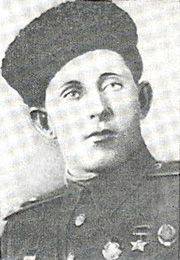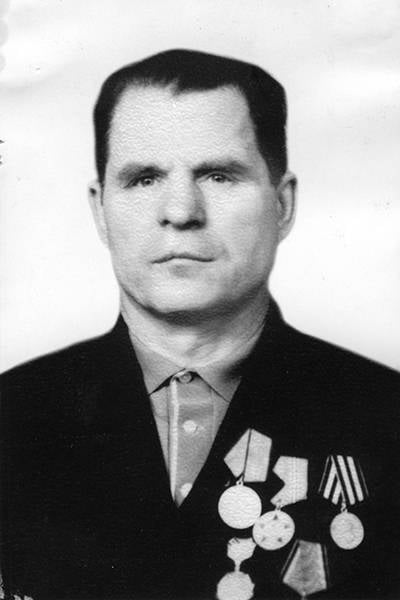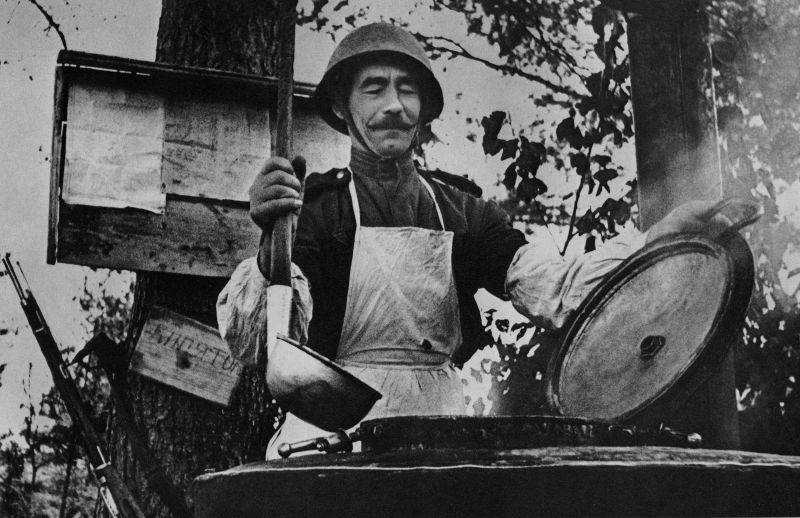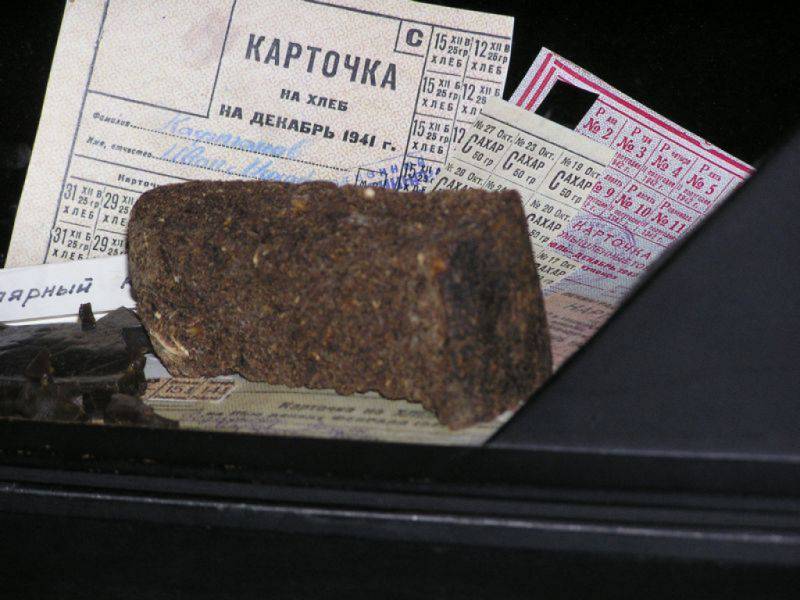About military porridge and bread
Such kitchens were based on a mobile chassis or truck platform and usually included from one to four large boilers. The leadership of our army proceeded from the fact that the soldier himself in his separate pot should not cook - a common meal, cooks for everyone, and this is very true and logical. And in the boiler, the water usually boiled over forty minutes - if we talk about the fire, and about the kitchen itself, which was adapted for heating wood. Therefore, lunch or dinner was prepared no less than one and a half hours.
Here are some daily allowances for the Red Army men and junior commanding staff: bread - from 800 to 900 grams (depending on the season), cereals - 140 g, meat - 150 g, potatoes - 500 g, lard or combizhir - 30 g, plus more vegetables, salt, vegetable oil, tea (1 g), pasta. The diet, perhaps, is not particularly refined, but nutritious. Although, of course, the conditions of war often made adjustments to the menu. And our fighters' favorite dishes were kulesh, borscht, cabbage soup, buckwheat with meat.
Here are some recipes from the field kitchen.
Kulesh. Cut meat from brisket and put bones in water to cook 20-30 minutes. After that, fill the broth with millet, put diced potatoes. While all this is boiled, fry the meat separately with onions and also add to the future dish. Do not turn off the fire for another ten minutes. Here you have liquid porridge or thick soup, but it’s very tasty.
In general, kulesh is considered not a Russian dish, but rather a Ukrainian one. And this very name is of Hungarian origin and means “millet, millet” or “thick porridge”. I must say, special attention was paid to porridges in the field kitchen. After all, in itself cooked cereals do not give much strength and quickly become boring. Therefore, the porridge tried to diversify, making the recipes various cheap ingredients that change the taste or add spice. The main magic sticks are onions and garlic. But there were parsley, dill, angelica in great price. Instead of butter, commonly used lard: melted, salted, smoked. It was used to make cracklings and add to the porridge. And in kulesh, as can be seen from the recipe, they put not only the cereal, but also the potatoes - all the nourishing and thick.
By the way, the famous fairy tale about the soldier’s porridge from an ax appeared not just like that, but with a prehistory. On one of the days of the Alpine crossing, Alexander Vasilyevich Suvorov was told that food supplies were running out, and the soldiers needed to be fed something. The great commander advised the cook to cook porridge from all that is: lard, meat, remnants of various cereals and peas. The main thing is to make the dish nourishing and preferably aromatic. The cook did just that. But the soldiers jokingly said that he had made porridge from the ax. But back to the recipes.
Millet porridge with garlic. It will take millet, water, vegetable oil, onion, garlic, salt. Proportion: three glasses of water - one glass of cereal. Pour water into the pot (this is, of course, up to date, and so in the pot), pour the cereal and put it on the fire. Meanwhile, fry the onions in the butter and add it as soon as the water boils. Salt After ten minutes, turn off the heat, put in the porridge finely chopped garlic, close tightly and, if possible, wrap for half an hour, so that the porridge is steamed and turned fragrant and tender.
Buckwheat. Fry the onions, preferably on fat. Mix it with stew and buckwheat. Salt, pour water and cook until done.
Carrot tea Grate the cleaned carrots and dry them in the oven or in a dry frying pan with chaga, and then just pour boiling water and let it brew.
"Makalovka." Frozen stew very finely chopped, fry the onion, mix it with the stew, add water and boil. A thick part of the dish was eaten like this, and slices of bread were dipped into the resulting broth, hence the name. Instead of stew, you can use lard or any fat, everything that is on hand at the cook.
About the cooks of the Great Patriotic War, too, is no good to be silent: these are people not only sharp-witted, but also brave. I can not remember history, which happened to Hero of the Soviet Union Ivan Pavlovich Sereda, cook of the 91st Tank Regiment of the 46th tank divisions of the 21st mechanized corps of the North-Western Front. In August 1941, our troops fought with the Nazis in the Dvinsk region of the Latvian SSR. In a small forest, Ivan Pavlovich was preparing dinner for his fellow soldiers. The soup was almost ready when the roar of the engine was heard very close and a German tank appeared. And our cook only has a rifle and an ax. Crossing from tree to tree and remaining unnoticed by the enemy, Sereda jumped right in front of the tank ... jumped on it and slashed with an ax along the barrel of the machine gun. He deftly threw a piece of tarpaulin onto the viewing gap and drummed it on the armor.
 - Kaput! - the brave cook shouted loudly. - Prepare grenades! Surround him guys!
- Kaput! - the brave cook shouted loudly. - Prepare grenades! Surround him guys!The Nazis were confused. And so frightened that almost immediately decided to surrender. The hatch opened, two arms extended out of it.
When the Red Army soldiers came to the chef for help, four fascists who had surrendered were already standing near the tank. Apparently, the Fritz could not believe that a single cook with a rifle and an ax handled them. And our soldiers, laughing enough, began to have their lunch still cold.
A separate conversation - about the front bread. The great merit is that the army was provided with “the head of the table” - the workers of the rear, for the most part - women.
Orders of military units were carried out by bakeries and bakeries in the first place, people did not spare themselves, sometimes working for days without days off. It was not always possible to deliver bread to the front line, and then the fighters themselves baked bread in homemade ovens. If they could not deliver the flour, then it was made from everything that was at hand at the time: vegetables, mushrooms, bran. Was added to the dust of stumps, quinoa, hay, straw, tree bark. The resulting flour was mixed with potatoes and baked soldier pancakes. Furnaces were made of clay and bricks.
So, in 1941, near the headwaters of the Volga, there was a starting line. Baking stoves were placed directly on the river bank (it was not for nothing that they were called earthen). Inside they were coated with a thick layer of clay or lined with brick. Usually, baked bread was baked in such ovens.
Several years ago I visited the upper reaches of the Volga. The guide, telling about the war years, showed up on the shore and said: “Here, on this earth, both battles were fought, concerts were held during a lull, and the injured were treated, and dinners were cooked, and pancakes were baked in homemade ovens ...”
Often the locals delivered bread to the fighters. Here are the memories of a participant in the Rzhev operation, Viktor Alekseevich Sukhostavsky: “After fierce battles, our part in the spring of 1942 was taken to the village of Kapkovo. Although this village was located at a distance from the fighting, but the food business was still rather weak. Village women brought us Rzhevsky bread, it was baked from potatoes and bran. They carried this bread to us every day, and we all thought: how do these women manage to bake so much bread? And most importantly - how much is left to them? It is unlikely that there is enough time for a full life ... ”
Here is the recipe for this "Rzhevsky" bread: boil potatoes, peel and crush thoroughly. Add bran, salt, knead the dough and bake.
Rye flour was not enough during the war, it was often replaced with barley. This did not make any special changes to the baking technology, except that the cooking time was increased, since the dough kneaded on barley flour is denser, it takes longer to bake. And the bread was delicious.
It is impossible not to recall the blockaded bread ... After the fascists took the city into a ring, the city’s reserves were quickly depleted (later they began to deliver the flour to the Road of Life). The composition of the besieged bread included wallpaper flour, oil cake, flour brooms from equipment, food pulp, and needles.
The former director of the Lipetsk school No. XXUMX, a native from Leningrad, Antonina Alexandrovna Karpova (nee Eliseeva), recalled: “For us it was something sacred. Total 29 grams of bread, you hold a slice in your hand and you know that not a crumb can be dropped. My road to work lay past the bakery. Many people used to gather here — of those who could still walk. We stood and breathed a delicious smell, dizzy. In my post-war life there was not a day for me to throw away the bread, even if it was dried, moldy ... ”
But the memories are also native Leningrads of Alexandra Mikhailovna Medvedeva (Leonova): “On the second day of the war I turned eleven, I graduated from the third class. My sister was four years old. When in the 1941 year, in November, they reduced the bread rate to 125 grams for children and 250 grams for workers, mother began to buy it herself. I went to the store in the evening, after work. In the apartment we had an old bookcase with a cabinet. The doors of the locker are carved, with a key. Our bread was kept in this locker under the lock. In the morning, before leaving for work, mother took out the bread, divided it into three parts, then each part into three more. Leave us for breakfast and lunch, the rest - for dinner - closed in the locker, and took the key with her. Somehow my mother forgot to take the key. When I went to the canteen to buy food stamps for cereal, my little sister, Svetlana, was visited by girlfriends. Svetlana opened a locker, and the girls ate bread. In the evening, mother came home from work with bread for tomorrow. He approaches the locker, opens it and sees: there is no bread for dinner. He asks: "Who ate the bread?" Svetlana burst into tears and told everything. Wiping tears, said: "Mom, kill me, still die." Mom looked at her - skin and bones - and wept. We had dinner without bread. The mom never touched the bread rate for tomorrow. She strictly observed that bread was consumed daily. "
And this, dear readers, is the memoirs of Dmitry Mikhailovich Ivanishchev, a war veteran. Dmitry Mikhailovich was drafted into the army in the 1941 year, served as a sergeant in the 422 rifle regiment of the 194 separate sapper battalion. Passed concentration camps - Auschwitz and Buchenwald - but survived. He met the victory in Berlin, and then for a long time worked in Ishim at a carpet factory.

“The bread of war cannot leave anyone indifferent, especially someone who has experienced terrible hardships during the war — hunger, cold, bullying. By the will of fate, I had to go through the Nazi camps. We are prisoners. We know the price of bread and adore it. The Nazis baked bread for Russian prisoners of war according to a special recipe. It was called “osten-ford” - only for Russians. Here is his approximate recipe: 40% extraction of sugar beet, 30% bran, 20% sawdust, the rest is flour from leaves or straw. True, in many camps did not give such bread. But I tried it ... "
I bow to you, veterans of the Great Patriotic. The path today on your table will be delicious ...


Information